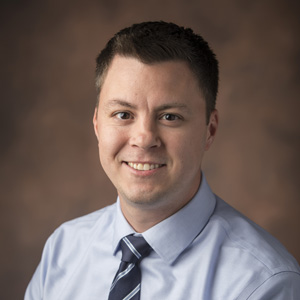Vanderbilt University’s Master of Science in Applied Clinical Informatics (MS-ACI) program and Vanderbilt University Medical Center have partnered with Omnicell, a leading provider of medication management solutions and adherence tools for health systems and pharmacies, to create a new two-year pharmacy informatics fellowship.

Nicholas Goldsmith, PharmD, Hanna Semega, PharmD, MBA, and Jay Patel, PharmD, have been selected as the program’s first fellows. They will take part in the fellowship from July to June 2024. Goldsmith will be based at VUMC for all aspects of his fellowship in partnership with Omnicell.
“We’re honored to provide the master’s program so the fellow can see how technology can benefit health care and how to be a leader in that field,” said Molly Knostman, PharmD, MHA, executive director of Inpatient Pharmacy Operations at Vanderbilt. “The fellowship will help fill some gaps we’ve seen in the workplace that will help promote better automation and serve better patient care.”
Vanderbilt’s MS-ACI program provides a 36-hour curriculum in 21 months and is designed for working health care professionals, such as physicians, nurses and pharmacists, to gain practical informatics and computer science training in health care. Professionals working in public health, health care policy, health information technology, research informatics and hospital/clinic management have also completed the program.

This new fellowship within the MS-ACI program creates a professional pipeline for fellows with pharmacy training who will have an opportunity to work on various pharmacy and informatics projects at Vanderbilt and receive a master’s degree in applied clinical informatics, while simultaneously being employed by Omnicell.
This year’s fellow will mainly be working with anesthesia workstation (AWS) cabinets, developed by Omnicell, by:
- Implementing and automating AWS cabinets in operating and procedure rooms, analyzing workflow processes and inventory, and gathering analytics on usage while working alongside nurses, pharmacists, anesthesiologists.
- Determining how AWS cabinets benefit users, whether there is an opportunity to save on medication costs, which workflow areas need improvement, employee satisfaction, and more.

Jay Patel, PharmD
“The is the first time we’ll be getting analytics on medication use and timing. There will be good financial data and it will allow us to look at our controlled substance accountability,” Knostman said. “The fellow will also see how putting in the AWS cabinet will impact certain procedures.”
“This fellowship can help us make our workflows more efficient and build useful tools, such as data dashboards, which can facilitate our work and seeing how the AWS cabinets work with our staff,” said Edward Woo, PharmD, associate director of Pharmacy Informatics in HealthIT.
Leaders like Woo and Knostman, who helped establish the fellowship program, said they wanted to explore post-graduation options for pharmacists who were interested in gaining more experience in data analytics, product management, automation in health systems and more.
“Pharmacy informatics is not always a topic that all pharmacy students learn when they are going through their training, and using a computer is something that most pharmacists do when they are taking care of patients,” Knostman said. “We wanted to provide an opportunity for fellows to learn more about informatics from the pharmacy perspective, so that they can develop a practice, reach more people, and help pharmacists and organizations by putting automation into their medication use practices.”
Scott Nelson, PharmD, MS, director of the Vanderbilt MS-ACI program, is excited for the opportunity to partner with Omnicell and recruit pharmacists to the MS-ACI program, which has typically trained physicians.
“I feel extremely fortunate to have completed an informatics fellowship after pharmacy school at the U.S. Department of Veterans Affairs and a master’s degree in informatics, so I’m excited to hear that there are more opportunities for advanced education in informatics targeted at pharmacists,” Nelson said. “It’s a great opportunity to educate the workforce as a whole and improve the processes in the health system.”











